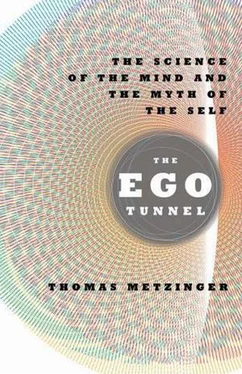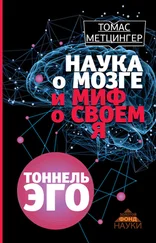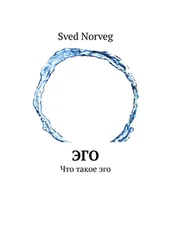Томас Метцингер - Туннель Эго
Здесь есть возможность читать онлайн «Томас Метцингер - Туннель Эго» весь текст электронной книги совершенно бесплатно (целиком полную версию без сокращений). В некоторых случаях можно слушать аудио, скачать через торрент в формате fb2 и присутствует краткое содержание. Жанр: Биология, на русском языке. Описание произведения, (предисловие) а так же отзывы посетителей доступны на портале библиотеки ЛибКат.
- Название:Туннель Эго
- Автор:
- Жанр:
- Год:неизвестен
- ISBN:нет данных
- Рейтинг книги:4 / 5. Голосов: 1
-
Избранное:Добавить в избранное
- Отзывы:
-
Ваша оценка:
- 80
- 1
- 2
- 3
- 4
- 5
Туннель Эго: краткое содержание, описание и аннотация
Предлагаем к чтению аннотацию, описание, краткое содержание или предисловие (зависит от того, что написал сам автор книги «Туннель Эго»). Если вы не нашли необходимую информацию о книге — напишите в комментариях, мы постараемся отыскать её.
Thomas Metzinger — The Ego Tunnel. The Science Of The Mind and The Myth Of The Self
Перевод с английского: Вячеслав Михайлов http://www.nwethik.com
Туннель Эго — читать онлайн бесплатно полную книгу (весь текст) целиком
Ниже представлен текст книги, разбитый по страницам. Система сохранения места последней прочитанной страницы, позволяет с удобством читать онлайн бесплатно книгу «Туннель Эго», без необходимости каждый раз заново искать на чём Вы остановились. Поставьте закладку, и сможете в любой момент перейти на страницу, на которой закончили чтение.
Интервал:
Закладка:
8. D. M. Wegner & T. Wheatley, «Apparent Mental Causation: Sources of the Experience of Will,» Amer. Psychol. 54(7):480–492 (1999).
9. Wegner & Wheatley, «Apparent Mental Causation» (1999), 488.
10. Ibid., 483.
11. See, for instance, P. Haggard, «Conscious Awareness of Intention and of Action,» in Johannes Rossler & Naomi Eilan, eds., Agency and Self-Awareness-Issues in Philosophy and Psychology (Oxford, UK: Clarendon Press, 2003). A good recent review is Patrick Haggard, «Human Volition: Towards a Neuroscience of Will,» Nat. Rev. Neurosci. 9:934–946 (2008).
12. It is true that indeterminacy exists on the subatomic level, but the mind cannot somehow sneak into the physical world through indeterminate quantum processes. (Nor is chance what we want: Philosophically, randomness in the brain would be just as bad as full determination.) Quantum theories of free will are empirically false as well: There may be different kinds of brains somewhere else in the universe, but in human brains the firing of neurons and so on take place on the macroscopic scale. For such huge objects as nerve cells at 37°C body temperature, quantum events simply play no role.
13. The voluntary inhibition of voluntary actions seems to be mostly determined by unconscious events in the anterior median cortex. See M. Brass & P. Haggard, «To Do or Not To Do: The Neural Signature of SelfControl,» J. Neurosci. 27:9141–9145. (2007).
14. See T. Metzinger, «The Forbidden Fruit Intuition,» The Edge Annual Question-2006: What Is Your Dangerous Idea? www.edge.org/q2006/q06_7.htmlfflmetzinger. Reprinted in J. Brockman, ed., What Is Your Dangerous Idea? Todays's Leading Thinkers on the Unthinkable (New York: HarperPerennial, 2007), 153–155.
15. It would not be a new thought in the history of philosophy. Vasubandhu, a fourth-century Buddhist teacher and one of the most important figures in the development of Mahayana Buddhism in India, reports: Buddha has spoken thus: 'O, Brethren! actions do exist, and also their consequences (merit and demerit), but the person that acts does not. There is no one to cast away this set of elements and no one to assume a new set of them. (There exists no individual), it is only a conventional name given to (a set) of elements.' Appendix to the VIIIth chapter of Vasubandhu's Abhidarmakoga, § 9: 100.b.7; quoted after T. Stcherbatsky, «Th Soul Thory of the Buddhists,» Bull. Acad. Sci. Russ. 845 (1919).
CHAPTER 5
1. The second question, of course, is the one Descartes asked in the first Meditation, when he realized that everything he had ever believed to be certain-including his impression of sitting by the fire in his winter coat and closely inspecting the piece of paper in his hands-could equally well have occurred in a dream. What makes the problem of dream skepticism so intractable is that even in a «best-case scenario» of sensory perception, there is apparently no reliable, fool-proof method of distinguishing wakefulness and dreaming. According to dream skepticism, literally all of our experiences of waking life could be nothing more than a dream, and we are unable, even in principle, ever to decide this question with certainty. For a detailed discussion of the problem of dream skepticism, see, for instance, Barry Stroud, The Significance of Philosophical Scepticism (New York: Oxford University Press, 1984). For the status of the phenomenal and the epistemic subject in the dream state, see J. Windt & T. Metzinger, «The Philosophy of Dreaming and Self-Consciousness: What Happens to the Experiential Subject During the Dream State?» in Patrick McNamara & Deirdre Barrett, eds., The New Science of Dreaming (Westport, CT: Praeger, 2007). See http://eprints.assc.caltech.edu/200/01/Dreams.pdf.
2. See J. A. Hobson et al., «Dreaming and the Brain: Toward a Cognitive Neuroscience of Conscious States,» Behavioral and Brain Sci. 23:793–842 (2000); and Antti Revonsuo, Inner Presence: Consciousness as a Biological Phenomenon (Cambridge, MA: MIT Press, 2006).
3. Helen Keller, The World I Live In (New York: New York Review Books, 2003).
4. H. Bertolo et al., «Visual Dream Content, Graphical Representation and EEG Alpha Activity in Congenitally Blind Subjects,» Cog. Brain Res. 15:277 284 (2003).
5. See C. H. Schenck, «Violent Moving Nightmares,» www.parasomniasrbd.com/; E. J. Olson et al., «Rapid Eye Movement Sleep Behaviour Disorder: Demographic, Clinical, and Laboratory Findings in 93 Cases,» Brain 123:331339 (2000); and C. H. Adler & M. J. Thorpy, «Sleep Issues in Parkinson's Disease,» Neurology 64 (suppl. 3):12–20 (2005).
6. See Hobson et al., «Dreaming and the Brain» (2000) for details.
7. F. van Eeden, «A Study of Dreams,» Proc. Soc. Psychical Res. 26:431–461 (1913).
8. Oliver Fox, Astral Projection (New Hyde Park, NY: University Books, 1962). Also quoted in S. LaBerge & J. Gackenbach, «Lucid Dreaming,» in Etzel Cardena et al., eds., Varieties of Anomalous Experience: Examining the Scientific Evidence (Washington, DC: American Psychological Association, 2000).
9. See Paul Tholey, Schopferisch traumen (Niedernhausen, Ger.: Falken Verlag, 1987).
10. See Stephen LaBerge & Howard Rheingold, Exploring the World of Lucid Dreaming (New York: Ballantine, 1990).
11. S. LaBerge et al., «Lucid Dreaming Verified by Volitional Communication During REM Sleep,» Perceptual and Motor Skills 52:727–732 (1981); and S. LaBerge et al., «Psychophysiological Correlates of the Initiation of Lucid Dreaming,» Sleep Res. 10:149 (1981).
12. For details, see P. Garfield, «Psychological Concomitants of the Lucid Dream State,» Sleep Res. 4:183 (1975); S. LaBerge, «Induction of Lucid Dreams,» Sleep Res. 9:138 (1980); S. LaBerge, «Lucid Dreaming as a Learnable Skill: A Case Study,» Perceptual and Motor Skills 51:1039-41 (1980); LaBerge & Rheingold, Exploring the World of Lucid Dreaming (1990); and G. S. Sparrow, «Effects of Meditation on Dreams,» Sundance Comm. Dream Jour. 1:48–49 (1976).
13. Hobson et al., «Dreaming and the Brain» (2000), 837. For details on the relation between the DLPFC and reflective thought, see A. Muzur et al., «The Prefrontal Cortex in Sleep,» Trends Cog. Sci. 6:475–481 (2002).
14. Tholey, Schopferisch traumen (1987), 97. English translation by T. Metzinger.
15. «Spandrels» refers to Stephen Jay Gould and Richard C. Lewontin's 1979 essay «The Spandrels of San Marco and the Panglossian Paradigm,» in which, using the architectural analogy, the authors argue that some biological features are exaptations: that is, currently used for something other than what they were «developed for» during natural selection. Proc. Royal Soc. London, Ser. B, Biol. Sci. (1934–1990) 205(1161):581–598 (September 21, 1979).
CHAPTER 6
1. For details, see G. Rizzolatti et al., «From Mirror Neurons to Imitation: Facts and Speculations,» in Andrew N. Meltzoff & Wolfgang Prinz, eds., The Imitative Mind: Development, Evolution, and Brain Bases (Cambridge: Cambridge University Press, 2002); and G. Rizzolatti & M. Gentilucci, «Motor and Visual-Motor Functions of the Premotor Cortex,» in Pasko Rakic & Wolf Singer, eds., Neurobiology of Neocortex (New York: John Wiley & Sons, 1988). An excellent recent overview is Giacomo Rizzolatti & Corrado Sinigaglia, Mirrors in the Brain: How Our Minds Share Actions and Emotions (Oxford: Oxford University Press, 2008).
2. The mirror-neuron system may occasionally go awry. Patients suffering from a rare but well-known neurological syndrome called echopraxia are inevitably forced to act out any behavior they observe in other human beings. What likely happens in these patients is that the mirror-neuron system is inadvertently coupled to the motor system because of lack of prefrontal inhibition. Your mirror neurons come online and lose their ordinary status as purely offline simulators. Therefore, you are literally driven by the actions you see other people performing.
Читать дальшеИнтервал:
Закладка:
Похожие книги на «Туннель Эго»
Представляем Вашему вниманию похожие книги на «Туннель Эго» списком для выбора. Мы отобрали схожую по названию и смыслу литературу в надежде предоставить читателям больше вариантов отыскать новые, интересные, ещё непрочитанные произведения.
Обсуждение, отзывы о книге «Туннель Эго» и просто собственные мнения читателей. Оставьте ваши комментарии, напишите, что Вы думаете о произведении, его смысле или главных героях. Укажите что конкретно понравилось, а что нет, и почему Вы так считаете.








